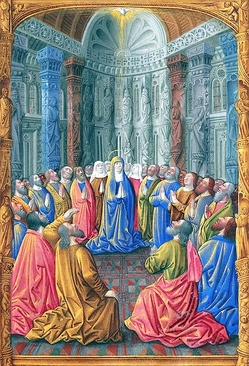 The Holy Spirit makes the Christian experience truly Catholic and universal, open to all human experience. To be Catholic is to be universal and open to the world. Not only to Canada, North America Europe or Asia, or a certain familiar part of the world or segment of society, but it must be open to all, to every single person. The mind of Christ is not intended to be a selective mentality for a few but the perspective from which the whole world will be renewed and redeemed. An insight like this, the universal scope of salvation did not however come easily and without much pain and confusion.
The Holy Spirit makes the Christian experience truly Catholic and universal, open to all human experience. To be Catholic is to be universal and open to the world. Not only to Canada, North America Europe or Asia, or a certain familiar part of the world or segment of society, but it must be open to all, to every single person. The mind of Christ is not intended to be a selective mentality for a few but the perspective from which the whole world will be renewed and redeemed. An insight like this, the universal scope of salvation did not however come easily and without much pain and confusion.
In fact, the whole of the New Testament can be understood precisely as the emergence of the Catholic, the universal, in Christian life. Christianity, had it not moved from where it was particular and small would have just been a small modification of the Jewish experience, a subset of Jewish piety that was still focused in and around Jerusalem and the restoration of a literal kingdom of Israel. The first two generations of Christians discovered that Christianity could not be just that. Because they had received the Holy Spirit, which is the universal principle, the Holy Spirit opened peoples’ eyes to the universal import of the Christian truth and through the encounter with non-Jews who received the Holy Spirit.
The artists of the Middle Ages often contrasted the Tower of Babel with the “Tower” of the Upper Room. Babel symbolizes the divisions of people caused by sin. Pentecost stands for a hope that such separations are not a tragic necessity. The babbling mob of Babel compares poorly with the heartfelt unity of the Pentecost crowd. Babel was a mob. Pentecost was a community. A people without God lost the ability to communicate. A people suffused with the Spirit spoke heart to heart.
At Pentecost the full meaning of Jesus’ life and message is poured into our hearts by the Spirit alive in the community. The New Testament seems to say that – for a fleeting moment – the nations of the earth paused from their customary strife and experienced a community caused by God. The brief and shining hour of Pentecost remains to charm and encourage us to this day.
These paragraphs come from Basilian Father Thomas Rosica’s essay on the Pentecost scriptures published on Zenit.org for May 28, 2009. Father Rosica is the executive director of Salt and Light TV.
A video on Pentecost can be seen here.